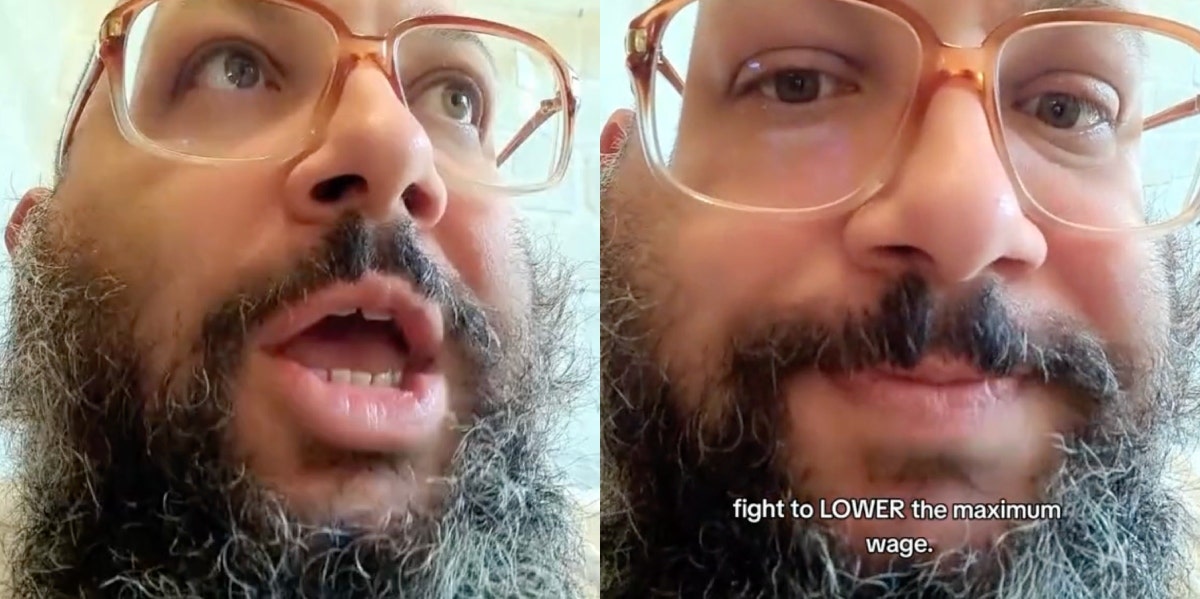Man Explains A Controversial Method For Getting Paid More Money At Work
It's a concept called "maximum wage."
 TikTok via @notkevinglidden
TikTok via @notkevinglidden Is the minimum wage too low? Kevin Glidden, who usually posts comedic content on TikTok, thinks it is — and has a unique idea on how to fix it.
Often, the remedy for getting more money into minimum wage workers' pockets is by doing the obvious: raising the minimum wage. However, his approach is different and comes with more accountability to the bosses.
He explains a controversial method for getting paid more money at work.
"If you want better wages, don't fight to raise the minimum wage. Fight to lower the maximum wage," he said.
He called on all workers' unions to shift their focus to this idea of a "maximum wage."
"Every union's sole proposal right now should be that executive compensation shall be limited to no more than ten times the compensation of the lowest paid employee in the company," he continued.
But why should that be their sole purpose?
He believes it will shift the conversation to holding big earners more accountable.
"Force them to make the argument that ten times the lowest wage is still too low," he said.
So, could this thought experiment really help raise the minimum wage?
Well, it's not a new idea and has even tried to be implemented before. Switzerland, for instance, had a referendum in 2013 on a proposal to limit executive pay to 12 times that of the lowest-paid employee, though it was ultimately rejected.
The reaction to Glidden's video has been mixed. Some viewers applauded his sentiment, with some calling ten times the lowest-paid employee too high of a maximum wage. Many suggested the number should be closer to five times.
However, others were unsure if the policy would be effective altogether.
"Too bad there is a loophole for that. Have a zero salary and get comped in stocks," one person wrote.
Though, Glidden rallied against this view in his reply to a similar comment.
"No stocks, options, or bonuses. Make them explain why they need those to do their job," he wrote.
The idea of linking executive compensation to that of the lowest-paid employee puts a new spin on the conversation.
As Glidden points out, by forcing executives and shareholders to defend why a tenfold difference in pay is insufficient, the dialogue shifts to a more foundational question of fairness and value within the corporate structure.
Moreover, Glidden's proposal might encourage companies to think more holistically about their compensation policies. If implemented, a capped ratio between the highest and lowest salaries could potentially foster a more equitable working environment. It may even prompt organizations to increase wages at the bottom if doing so would allow for higher compensation at the top.
One person pointed out in the comments that the soap company, Dr. Bronner's, implements this philosophy.
"Dr. Bronner's caps the total compensation of the highest-paid employees executives at five times that of the lowest-paid fully-vested position," they wrote on their website.
More companies that opt to do this could incentivize others to follow suit. While the concept may not be a panacea for all the issues surrounding wage inequality, it offers a fresh perspective on a perennial problem.
Ethan Cotler is a writer and frequent contributor to YourTango living in Boston. His writing covers entertainment, news, and human interest stories.

